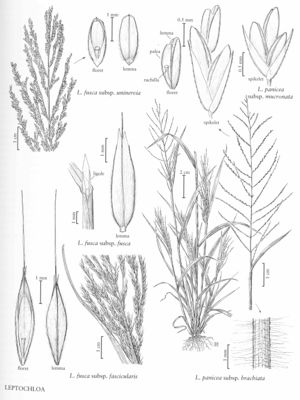Difference between revisions of "Leptochloa fusca subsp. uninervia"
FNA>Volume Importer |
FNA>Volume Importer |
||
| Line 19: | Line 19: | ||
-->{{Treatment/Body | -->{{Treatment/Body | ||
| − | |discussion=<p | + | |discussion=<p>Leptochloa fusca subsp. uninervia is native from the southern United States to Argentina. It may be confused with L. scabra, from which it usually differs in its truncate or obtuse lemmas.</p> |
|tables= | |tables= | ||
|references= | |references= | ||
| Line 35: | Line 35: | ||
|basionyms= | |basionyms= | ||
|family=Poaceae | |family=Poaceae | ||
| + | |illustrator=Linda A. Vorobik and Karen Klitz | ||
|reference=None | |reference=None | ||
|publication title= | |publication title= | ||
|publication year= | |publication year= | ||
|special status= | |special status= | ||
| − | |source xml=https:// | + | |source xml=https://bibilujan@bitbucket.org/aafc-mbb/fna-data-curation.git/src/314eb390f968962f596ae85f506b4b3db8683b1b/coarse_grained_fna_xml/V25/V25_89.xml |
|subfamily=Poaceae subfam. Chloridoideae | |subfamily=Poaceae subfam. Chloridoideae | ||
|tribe=Poaceae tribe Cynodonteae | |tribe=Poaceae tribe Cynodonteae | ||
Revision as of 16:18, 30 October 2019
Culms (15)25-110 cm, more or less erect, often branch¬ing from the aerial nodes. Blades usually densely scabrous on both surfaces, not exceeding the panicle. Panicles 10-57 cm long, (0.5)3-18 cm wide, often ellipsoidal, usually completely exserted from the upper¬most leaf sheaths; branches 2-11 cm, mostly ascending. Spikelets 5-10 mm. Lower glumes 1-2.6 mm, narrowly triangular to ovate; upper glumes 1.8-2.8 mm, obovate to widely obovate; lemmas 2-3.6 mm, light brown, dark green, or lead-colored, usually without a basal dark spot, apices usually truncate or obtuse, rarely broadly acute, sometimes bifid, sometimes mucronate; anthers 3, 0.2-0.6(1) mm. Caryopses 1-1.5 mm.
Discussion
Leptochloa fusca subsp. uninervia is native from the southern United States to Argentina. It may be confused with L. scabra, from which it usually differs in its truncate or obtuse lemmas.
Selected References
None.
